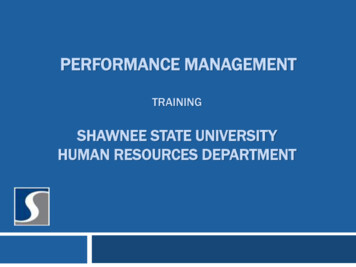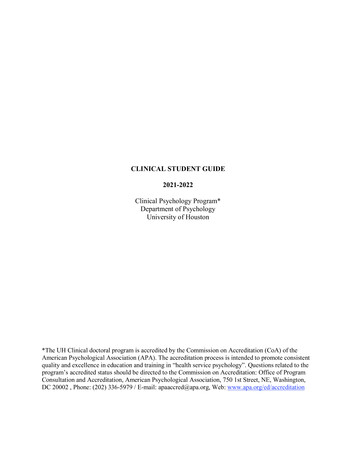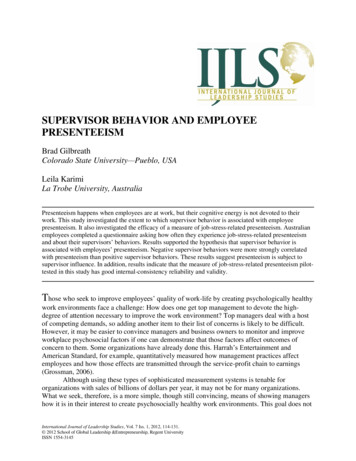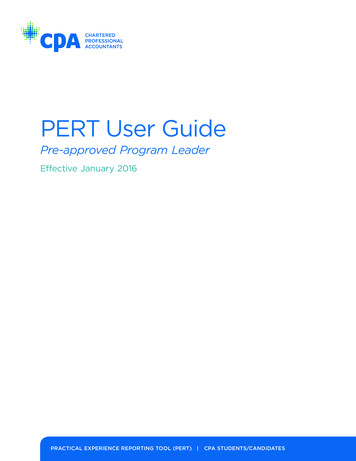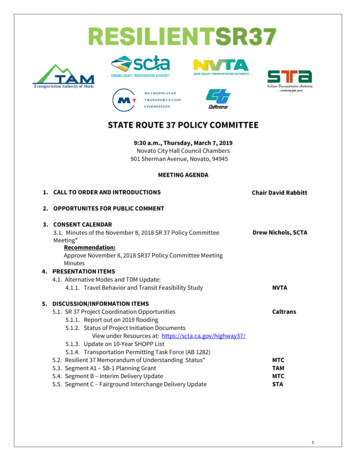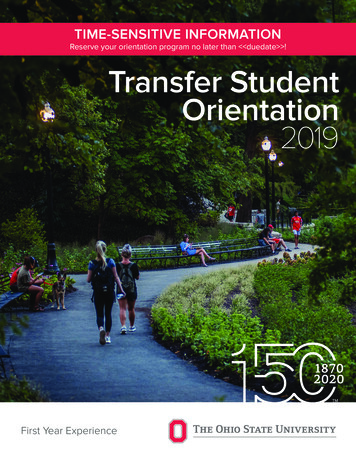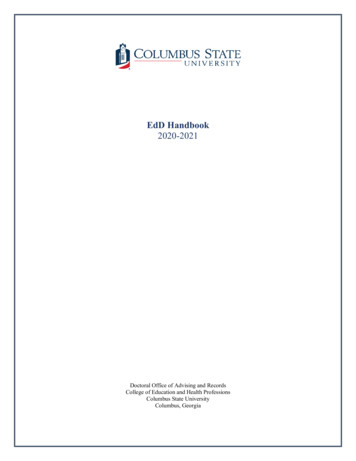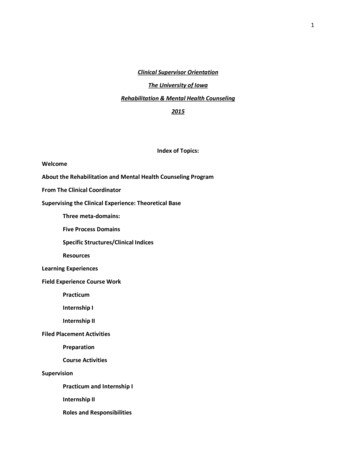
Transcription
1Clinical Supervisor OrientationThe University of IowaRehabilitation & Mental Health Counseling2015Index of Topics:WelcomeAbout the Rehabilitation and Mental Health Counseling ProgramFrom The Clinical CoordinatorSupervising the Clinical Experience: Theoretical BaseThree meta-domains:Five Process DomainsSpecific Structures/Clinical IndicesResourcesLearning ExperiencesField Experience Course WorkPracticumInternship IInternship IIFiled Placement ActivitiesPreparationCourse ActivitiesSupervisionPracticum and Internship IInternship IIRoles and Responsibilities
2Evaluation ProceduresPolicies and ProceduresPrerequisitesCalendarSelection of Placement SitesChange of PlacementClinical AppealsAccommodationsImpaired student policyConfidentialityTransporting ClientsCriminal background checksProfessional Liability InsuranceAbiding by Codes of EthicsThank youWelcomeWelcome to the University of Iowa Rehabilitation and Mental Health Counseling Program ClinicalSupervisor Orientation!Thank you very much for taking an interest in training new counselors and taking time to prepare tooffer counselors-in-training a meaningful learning experience. The purpose of this orientation is toprovide you with an overview of the Rehabilitation and Mental Health Counseling Program, oursupervision philosophy, and how that philosophy is operationalized in terms of activities and requireddocumentation. The orientation includes instructional videos and written materials that you can reviewat your own pace and refer back to as needed. Counselors-in-training from the Rehabilitation andMental Health Counseling Program always have access to this same material and can provide you withcopies.About the Rehabilitation and Mental Health Counseling ProgramThe Rehabilitation and Mental Health Counseling Program began in 1957 as a Vocational RehabilitationCounselor training program located in a house and sharing space with state vocational rehabilitationservices. Classes were taught throughout the University community. Rumor has it that is the 1970’ssome classes were taught in a favorite bar. The Program has matured and celebrated its 50th anniversary
3in 2007. Through the leadership of notable persons in the counseling profession, the Rehabilitation andMental Health Counseling Program has been nationally recognized as a being one of the top 3 schools incounselor training in the United States and having dedicated counselor training facilities. The program isunique in that it is dually accredited. The Council on Rehabilitation Education (CORE) accredits theProgram to train counselors as rehabilitation counselors and the Council for accreditation of Counselingand Related Educational Programs (CACREP) accredits the Program as a mental Health counseloreducation program.Students earn a Master’s in Arts in Rehabilitation and Mental Health Counseling. Most students takeand pass the Certified Rehabilitation Counselor Exam which makes graduates eligible for licensure asmental health counselors. About 50% of students go on to earn a mental health counselling licensethrough additional post-graduation supervised practice. Graduate work throughout the United Statesand internationally. Examples of employment include mental health counselor, vocational rehabilitationcounselor, substance abuse counselor, forensic expert, case manager, and consultant. Graduates workfor the state and federal government, Veteran’s Administration, private practice, community mentalhealth services, and non-profit organizations such as Easter Seals and National Alliance for the MentallyIll.Program administration consists of a Program Coordinator who is responsible for the day to dayactivities of the learning community and the Clinical Coordinator who is responsible for clinical activities.The Program is a part of the Rehabilitation Counselor Education Department which includes TheRehabilitation Counseling Program, Mental Health Counseling Program, School Counseling Program(MA), the Couples and Family Therapy Program (PhD) and the Counselor Education and SupervisionProgram (PhD). The Program is a part of the College of Education at the University of Iowa. Facultyoffices, classrooms, and clinical training rooms equipped with one-way observation mirrors and videorecorders are located in the third floor of Lindquist Center, which is in downtown Iowa City. Iowa.Supervision TipCounselors-in-training may perceive that site activities are not related to their eventual careergoals. This misperception often occurs among novice counselors because they tend to focus on thecontent (client diagnostic characteristics, setting specific features, documentation) rather thanprocess issues (ethics, consistency, case management). During supervision, it is often helpful todiscuss how the daily activities of your setting compare and contrast with other settings you andthe student have experienced to encourage generalization.John is a new counselor-in-training and he has the career goal to work in private practice andbecome skilled in existential therapy. He is placed in a substance abuse treatment center providingcognitive behavioral psychoeducational group intervention. To assist John is applying the skills he isusing to his future career, you encourage him to discuss how he will use what he is learning inprivate practice to assess substance abuse issues, provide treatment or referral, evaluate outcomesof treatment, manage cases, and self-care as a therapist.From the Clinical Coordinator
4I am pleased to be the Clinical Coordinator and I look forward to working with students and communitypartners to offer clinical training experiences that exceeds CORE and CACREP standards forrehabilitation and for mental health counseling.My approach to clinical supervision is grounded in a developmental approach to competency basedtraining. I anticipate that every counselor-in-training will grow in professional identity, ethicalresponsibility, and multicultural competency that are the hallmark of an expert counselor. As ClinicalCoordinator I want to provide motivational cognitive behavioral supervision to assist counselors-intraining to become self-aware of their own skills, attitude’s, and professional identity through accurateself-evaluation, realistic goal setting, and meaningful evaluation and self-reflection.1. Many counselors-in-training have the misperception that it is important to obtain training thatfocuses on the diagnostic label of clients (i.e. working with persons with substance abuseproblems, working with persons who have depression). In fact, it is much more important thatcounselors-in-training receive a supervised experience in the following skill areas, regardless ofthe characteristics of consumers served:2. Case management (examples include: working as a team, written documentation, caseconceptualization, outcome evaluation, time management)3. Individual intervention (examples include: intake, psychotherapy, follow-up, education,individual supervision)4. Group intervention (examples include: psychoeducational, psychotherapeutic,, groupsupervision)5. Career development (examples include: job development, job placement, human resources,employer consultation)As Clinical Coordinator, I have professional obligations to our graduate students-in-training, as well asthe clientele served by those students. In an effort to facilitate students’ professional development andultimate completion of their program, I conduct ongoing reviews of students. The Department facultyhave identified expected professional behaviors and are committed to assisting students in developingthese behaviors, working through obstacles that may impede their development, and implementingplans for remediation when necessary.
5I look forward to working with each student and helping to develop a plan of study and clinicalexperience that leads to an awesome career. It is always my goal to encourage students to complete aportfolio of supervised experiences that will lead to becoming a top choice for future employers.Supervision TipCommunication is the key to a successful field experience. Always feel free to contact the ClinicalCoordinator if you have concerns or to be proactive in preventing issues. In addition, life happens!Unexpected staff departures, medical emergencies, and program changes are a regular part ofworking in helping professions and we are prepared to assist you and the student in the event ofan unforeseen problem.For example, John is completing a field placement and unexpectedly his site supervisor leaves foranother job opportunity. The agency should contact the Clinical Coordinator as soon as possible inorder that the Clinical Coordinator can reassure John that there is support, assist your program indetermining if a replacement supervisor is possible, assist John and your program in temporarilyproviding a University site supervisor if possible, or working with John to secure a replacementexperience.Supervising the Clinical Experience: Theoretical BaseThe program's clinical component is structured on a developmental model which assumes thatcounselors-in-training progress through four levels (Level One, Level Two, Level Three, and Level ThreeIntegrated) while learning to function clinically in diverse settings. According to Maki and Delworth's(1995) Structured Developmental Model (SDM), as individuals progress through these levels, changeoccurs in a continuous manner with regard to the following overriding structures, or clinical indices: selfand other awareness, autonomy, and motivation.Three meta-domainsThe three meta-domains are regarded as primary domains because they virtually permeate theremaining five process domains, or those domains involved in the counseling process. These three metadomains are:1. Sensitivity to individual differences, or those differences between both the various clients servedas well as the differences between the client and the counselor;This domain refers to the counselor-in-training sensitivity to the individuality of clientele andstresses the importance of developing awareness of the gender, racial, cultural, and otherdifferences and similarities (e.g., disability) between them. This includes viewing the client as animportant source of information. The counselor-in-training will ultimately need to assess howalike or different they are from their clients along a variety of these dimensions, and the impactof these factors on their ability to connect with them and thus promote the development of thecounseling relationship.2. Theoretical orientation, or the counselor's theoretical basis for guiding intervention;
6This domain refers to the importance of developing a particular intentionality to counseling thatincorporates the counselor-in-training's specific beliefs (e.g., theory, philosophy) and approachto client assessment and intervention. The Counselor-in-Training will need to clearly understandand be able to apply a specific theoretical approach (or a combination of approaches andtechniques if one subscribes to eclecticism or an integrated approach) to all of the processdomains. These process domains are inclusive and descriptive of the counseling process.3. Ethics, or the fair and beneficent treatment of clients;This specific domain refers to the importance of not only knowing specific ethical guidelines andadhering to them, but also to the importance of realizing when ethical dilemmas exist, andfurther developing methods to resolve those dilemmas (Cottone & Tarvydas, 2007). A clearunderstanding of the principles that serve to guide ethical decision-making, along with theinevitability of the occurrence of ethical dilemmas during the counseling process, support theoverriding importance of this domain.Five Process DomainsLearning in the 3 meta-domains simultaneously occurs with activities (or processes) that occur as thecounselor-in-training has supervised experiences. The five process domains are briefly summarized asfollows (see Maki and Delworth, 1995, for a thorough discussion of this model):1. Interpersonal assessment, which refers to the importance of the counseling relationship inevaluating the social skills, personality characteristics, and interactional style of the client.This domain refers to the counselor-in-training ability to use his or her own personality in orderto facilitate an accurate assessment of the client's status and current situation. An importantconsideration here is the establishment and maintenance of the counseling relationship.Interpersonal and social skills are believed necessary for the establishment of this relationship.Gelso and Carter (1985) believed that without the Rogerian-based components of empathy,genuineness, and respect, development of the counseling relationship may be jeopardized.Additionally, Bordin (in Gelso and Carter) believed that this relationship was not only important,but was also developed early on in the counseling relationship and was necessary later on asclients processed their counseling outcomes.2. Individual client assessment, which refers to the focus on the person and relate psychometricand/or situational assessment.This domain refers to the assessment of client skills, abilities, and needs in order to serve theclient more effectively. Assessment information ranges from objective, psychometrically soundinstrumentation (e.g., administration of a depression inventory or vocational preferenceinventory), to clinical judgment based upon a structured (or unstructured) interview with theclient. Included as important in this assessment process domain are those client behaviors thatmay seem contradictory to client statements. One example of this might include the clients'statements regarding a self-described troublesome situation in which the mood of the clientduring these statements does not fit the situation very well. Counselor skills are important tonot only be aware of inconsistencies such as this, but also to be able to address them effectively.
73. Case conceptualization, or an integration of interpersonal assessment and individual clientassessment in order to form a holistic view of the client and his/her situation.This domain refers to the necessity of conceptualizing a client's specific situation in order todevelop an appropriate treatment plan. Viewed as an integration of the interpersonalassessment domain and the individual client assessment domain (above), the caseconceptualization domain is believed necessary in order to form a more holistic view of theclient and his/her situation. The case conceptualization includes information, both verbal andwritten, across a wide range of factors. Following this case conceptualization, development is ofa conceptual hypothesis testing format, based upon this information, that allows the counselorto summarize the issues, identify major themes that have emerged, and synthesize theinformation in a meaningful and theoretically sound manner so that it naturally proceeds todevelopment of an individualized treatment plan.4. Treatment goals or plans, or what the client and the counselor hope to accomplish together.This domain refers to the ability of the counselor-in-training to develop a series of goals andobjectives, or what the client and the counselor hope to accomplish together, with each clientthe counselor is involved with. This specific domain includes goals and objectives, both on ashort- and long-term basis that are agreed upon by the counselor and client. It is here, perhapsmore than anywhere else in the counseling process that the importance of the counselor-clientrelationship comes into play. Clearly, empathy, genuineness, and respect are necessary if theclient is to take risks for the benefit of future successes. Additionally, treatment plans will notwork without some difficulties emerging along the way. Thus, the counselor-client relationshipmust be able to withstand the peaks and valleys that are part and parcel of the counselingprocess (Gelso & Carter, 1985). It is also here that the importance of a theoretical orientation isemphasized. Theoretical orientation is necessary to guide clinical intervention because itprescribes conditions necessary for development as well as subsequent change. The counselorin-training must always remember that the client is involved because they (or others) desire achange in their feelings, beliefs and/or behaviors. Theory can facilitate that change in asomewhat orderly manner. Without theory to guide clinical intervention, the counselor is left toguesswork, and the stakes involved in the client's clinical outcome are clearly much too high forguessing. In addition to the therapeutic factors imbedded in the plan, case management, as wellas environmental consultation and advocacy considerations must be incorporated for ultimatesuccess.5. Intervention strategies, or a plan of action.This domain refers to the development of a plan of action, with the counselor-in-trainingassessing their own scope of practice and competence within the specific counseling activity.Over time, counselors are able to assess their intervention techniques as a function of clientprogress. Generally, intervention strategies must be at least a) malleable, and b) appropriate tothe established goals and objectives. The former condition refers to the importance of otherissues that may emerge during the counseling process that further call for a change inintervention strategy. Process (e.g., counseling process) almost always involves spontaneity.Intervention strategies obviously do not always account for that spontaneity, so they must besomewhat flexible. Related to the latter condition, intervention strategies might include those of
8both a short-term (e.g., immediate) nature as well as a long-term nature. Thus, interventionsshould fit the intended goals and objectives.Supervision TipThere are different models for counselor training. The developmental model which the University ofIowa employs look to counselor growth in the domains as indicators of success. An alternativemodel which you may be familiar is an apprentice model. The apprentice model is often describes as“see one, do one, teach one” in which a novice replicates the behavior of a skilled master until thecriteria for success is accomplished. Such an approach is valuable and comfortable for novicecounselors-in-training because the expectations are clear. However, the approach tends toencourage novice counselors to develop an external focus on career development which centers onmeeting professional obligations rather an internal focus personal growth as a professional.John is a novice counselor who is performing many counselor tasks for the first time. He isunderstandable nervous and desires to perform well. As his repertoire of counselor skills (his ‘bag oftricks”) is limited he tends to attempt to copy your mannerisms, style, and pace. This behavior in anovice counselor leads to a poor therapeutic alliance. In the apprentice model, you might practicewith him and encourage him to watch you carefully. Supervision may consist of you pointing outwhere he was successful in matching your style and instances where there were variance. Theoutcome measure may be to reduce variance between your style as an expert and his style as anovice.In the developmental model, a supervisor may encourage John to develop his own style that isconsistent with the content and therapeutic intent of the setting. As a supervisor, you may want todiscuss how John perceives the difference and similarities between your style and his own andbecome aware of how those differences impact the therapeutic alliance. You may choose to discussand practice skills that increase his repertoire in the 5 process domains.For example, John appears to be attempting to replicate your conceptualizations of clients’ issues.You note this as he rarely contributes new ideas in staffing, tends to repeat your statements, his casenotes appear repetitive and similar across clients, and when there are disagreements about clientissues, tend to agree with an authority figure quickly. Activities that may assist John in thedevelopmental model may include reading several case files of clients who have similar issues buthave different courses of intervention, attending staffing for a variety of consumers, discussions withother counselors about how they conceptualize client issues, and proving him with the opportunity toobserve or conduct intakes with new consumers and discuss his conceptualization of the client’sissues prior to staffing.
9Specific Structures/Clinical IndicesAs the counselor-in-training has experiences in the meta and process domains, the Program looks atspecific clinical indices of counselor development. These indices are used to evaluate the counselor-intraining’s developmental growth. These are described as the basic components of counselordevelopment and subsequent change as a function of that development:1. Self and other awarenessThis structure reflects the supervisee's primary focus as one of self-focus that includes both acognitive and an affective component. A Level One counselor focuses on his or her ownperformance as a function of both performance and evaluation anxiety. A Level Two counselorfocuses more on the cognitive and emotional experiences of the client and may, in fact, becomelost or over-involved in those feelings. A Level Three counselor develops a reciprocalappreciation of their own impact on the client and the client's impact on them.2. MotivationThis structure reflects the supervisee's motivation for becoming and performing as a counselor,although this motivation occurs, it varies in energy level. A Level One counselor is motivated byan intense desire to become a counselor. A Level Two counselor may exhibit a fluctuating levelof motivation as a function of assessment of their own skill level and the myriad of issues thatclients bring to a counseling setting. A Level Three counselor exhibits a consistent level ofmotivation as a result of a better understanding of counseling and its limitations, includingdevelopment of their own professional identity.3. AutonomyThis structure reflects individual clinical decision-making activity and one pole of an autonomy –dependency continuum. Autonomy is the ultimate goal of professional counselor development.It should be clear that the three primary domains individually and collectively influence each of the fiveprocess domains. As the counselor-in-training transitions through the levels, increased competence inthe clinical indices mentioned earlier can be observed and, in fact, measured.At Level One: Counselors-in-training are both highly dependent on their supervisor and highly motivatedto learn. They are viewed as being self-focused and are thus concerned with their own performancemore than their clients. Level One counselors will often times adapt the techniques modeled for themby their supervisors or will try to implement a "textbook" approach to intervention. A high level ofanxiety is typical of the Level One counselor. Generally, counselors-in-training should be transitioning toLevel Two by the end of Pre-Practicum. This transition is believed necessary for a successful Practicum,the first community-based, clinical experience.At Level Two: The counselor-in-training is more client-focused and offers less of a textbook approach totheir work. Their own style and counseling personality begin to develop, and they are more willing to getboth cognitively and emotionally involved with their clients. Due to the development of a knowledgeand skill base, Level Two counselors begin to struggle with the conflicting need for supervision and, atthe same time, the desire for autonomy in their work. Thus, a classic dependency-autonomy conflicttypically results and is one of the salient characteristics of Level Two counselors. By the end of Practicumand the Advanced Practicum, counselors-in-training are transitioning to Level Three. This transition isbelieved necessary for a successful internship experience.
10At Level Three: The counselors-in-training begin to develop a more collegial relationship with theirsupervisor and related professionals. Level Three counselors are no longer characterized by Level Oneanxiety and have developed a somewhat confident style in both their counseling and professionalrelationships. Level Three counselors can truly empathize with their clients and an increased selfawareness allows for clear boundaries in their relationships with clients. At this level, counselormotivation becomes rather stable in nature as opposed to the high level of motivation that ischaracteristic of Level One. Counselors-in-training will ideally function at Level Three at the completionof the internship requirement.A fourth level, or Level Three-Integrated, counselors are sometimes referred to as "master counselors",which is reflective of, and also the result of, many years of clinical experience. Thus, there is aninteraction between the overriding structures, or clinical indices, and the specific meta and processdomains.The behaviors in indicative of change in the clinical development of the counselor-in-training changeover time as a function of this developmental process. In order to subsequently provide and participatein effective supervision it is critical to be aware of these changes, both related to the structures anddomains as operationalized in the following manner. The SDM paradigm (Maki & Delworth, 1995) thusemphasizes the importance of each metadomain in the development of each remaining process domain,since the meta-domains independently influence these process domains. For example, treatment goalsand plans need to include a theoretical orientation (to guide the intervention), need consideration ofindividual differences (to maintain the individuality of the client during intervention), and needprofessional ethics (to provide the intervention within the parameters of ethical treatment). Appropriateclinical development of the counselor-in-training is the intended outcome for this clinical curriculum.Thus the program's clinical component is structured on a developmental model which assumes thatcounselors-in-training progress through four levels while learning to function in a clinical setting. Asindividuals progress across these levels, change occurs in a continuous manner with regard to thefollowing: self and other awareness, motivation, and autonomy. As the individual transitions throughthe levels, increased competence in the following can be observed: awareness of individual differences,an awareness of professional ethics, conceptualization of a theoretical orientation, interpersonalassessment, assessment techniques, client conceptualization, and ability to complete treatment goalsand plans, and intervention skills. Supervisors need to be aware of these domains and adjust theirinterventions accordingly to enhance the development of rehabilitation counselors’ competence acrossthe curriculum.The ultimate goal of the program is to provide the pre-service foundation for the counselor to become aLevel Three Integrated professional who is able to function ethically and independently. It is believedthat this level can occur with supervised experience and continuing education after graduation. It isbelieved that through the didactic curriculum, practicum experiences, and clinical internship,counselors-in-training will acquire the confidence and competence needed to reach this professionallevel of functioning.
11Supervision TipIn order to assist community partners with the developmental approach to counselor education andsuppression, the Rehabilitation & Mental Health Counseling Program suggests the following videoresources:Counseling Supervision - The Integrated Developmental Model by Todd Grande available at:https://www.youtube.com/watch?v Gu7cIST3Q4I This presentation is a Power Point overview ofthe developmental model and the meta and process domains.A Developmental Theory for the Clinical Supervision of Counselors Encountering Suicidal Clients byKatherine Heimsch available at: https://www.youtube.com/watch?v 23AfQXWxXWwThis presentation is a simulated supervision session in which a supervisor uses a developmentalapproach to assist a Level 1 counselor-in -training who is working with a client who expresses suicidalideation.
12Supervision TipNovice counselors-in-training who have had no prior experience can be described as Level 1 in theirdevelopment. These counselors will be most comfortable with structure and direction. They mostoften use a match to sample approach to work.John is in his first practicum. He is eager to do well. You notice that he is failing to inform clients ofconfidentiality obligations prior to beginning sessions despite clear direction on this issue. Upondiscussion, John informs you that he observed a senior colleague on one occasion and the seniorcolleague remarked that she does not always discuss confidentiality. As a Level 1 counselor, John hasincorrectly generalized that single observation and he has interpreted that “experts’ do not alwaysdiscuss confidentiality with clients as a first part of the counseling encounter. You may want to discusswith John that while he may observe differences in counseling technique, he should develop his ownstyle that incorporates best practices.More experienced counselors-in-training (especially those with prior professional experience) may bedescribed as Level 2 in their development. These counselors will often comparing and contrastingdifferent experiences to arrive at universal “truths” about clients. They often have difficultymanaging conflicting information as a whole, more often they perceive a “truth” and a “falsehood”rather than understanding that there could be multiple ways of conceptualizing an event. Counselorswho are Level 2 often have ethical concerns, they know the Codes but are unskilled in the applicationand thus
Students earn a Master's in Arts in Rehabilitation and Mental Health Counseling. Most students take and pass the Certified Rehabilitation Counselor Exam which makes graduates eligible for licensure as mental health counselors. About 50% of students go on to earn a mental health counselling license



